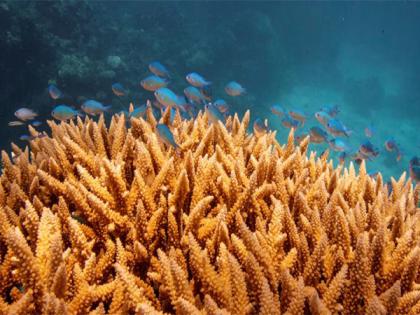Australia's Great Barrier Reef suffers most widespread coral bleaching on record
By ANI | Updated: August 6, 2025 17:44 IST2025-08-06T17:36:05+5:302025-08-06T17:44:53+5:30
Sydney [Australia], August 6 : The Great Barrier Reef has suffered its most widespread coral bleaching on record as ...

Australia's Great Barrier Reef suffers most widespread coral bleaching on record
Sydney [Australia], August 6 : The Great Barrier Reef has suffered its most widespread coral bleaching on record as ocean temperatures soared in 2024, Al Jazeera reported, citing a new Australian government report.
According to Al Jazeera, the Australian Institute of Marine Science (AIMS) said on Wednesday that it surveyed the health of the reefs between August 2024 and May 2025 and found the "most spatially extensive" bleaching since records began in 1986, which was "predominantly driven by climate change-induced heat stress".
Scientists also found that coral cover declined by almost one-third, down to just 26.9 per cent, in the southernmost third of the reef, as the southern reefs experienced their highest recorded levels of heat stress. "The declines in the north and south were the largest in a single year since monitoring began 39 years ago," the study's authors wrote in The Conversation, Al Jazeera reported.
Described as the world's largest living structure, the Great Barrier Reef spans 2,300 kilometres and houses a rich array of biodiversity. AIMS CEO Professor Selina Stead said that "mass bleaching events are becoming more intense and are occurring with more frequency". She added, "The future of the world's coral reefs relies on strong greenhouse gas emissions reduction."
Stead further noted that managing local pressures and helping the reefs to "adapt to and recover from the impacts of climate change" was also important, Al Jazeera reported.
According to UNESCO, which has classified the Great Barrier Reef as a World Heritage Site, the ecosystem is home to the world's largest collection of coral reefs, including 400 types of coral, 1,500 species of fish, 4,000 types of mollusc, 240 species of birds, as well as species such as the dugong and the large green turtle.
While United Nations experts say the Great Barrier Reef should be included among the World Heritage Sites classified as "in danger", the Australian government has lobbied to keep it off the endangered list, fearing it could affect the billions of dollars in tourism revenue it generates annually, Al Jazeera reported.
In a report released last week, Australia's Climate Change Authority said that opportunities to protect the Great Barrier Reef from climate change include major fossil-fuel exporting countries adopting low- and zero-emission alternatives and stronger action on climate pollutants, such as methane, which "contribute most to near-term climate warming".
However, Australia remains a major exporter of fossil fuels.
The authority's report also noted that some 93 per cent of the excess heat in the atmosphere has been absorbed by the world's oceans, and that 2024 ocean temperatures surpassed the previous record set in 2023, Al Jazeera reported.
Disclaimer: This post has been auto-published from an agency feed without any modifications to the text and has not been reviewed by an editor
Open in app